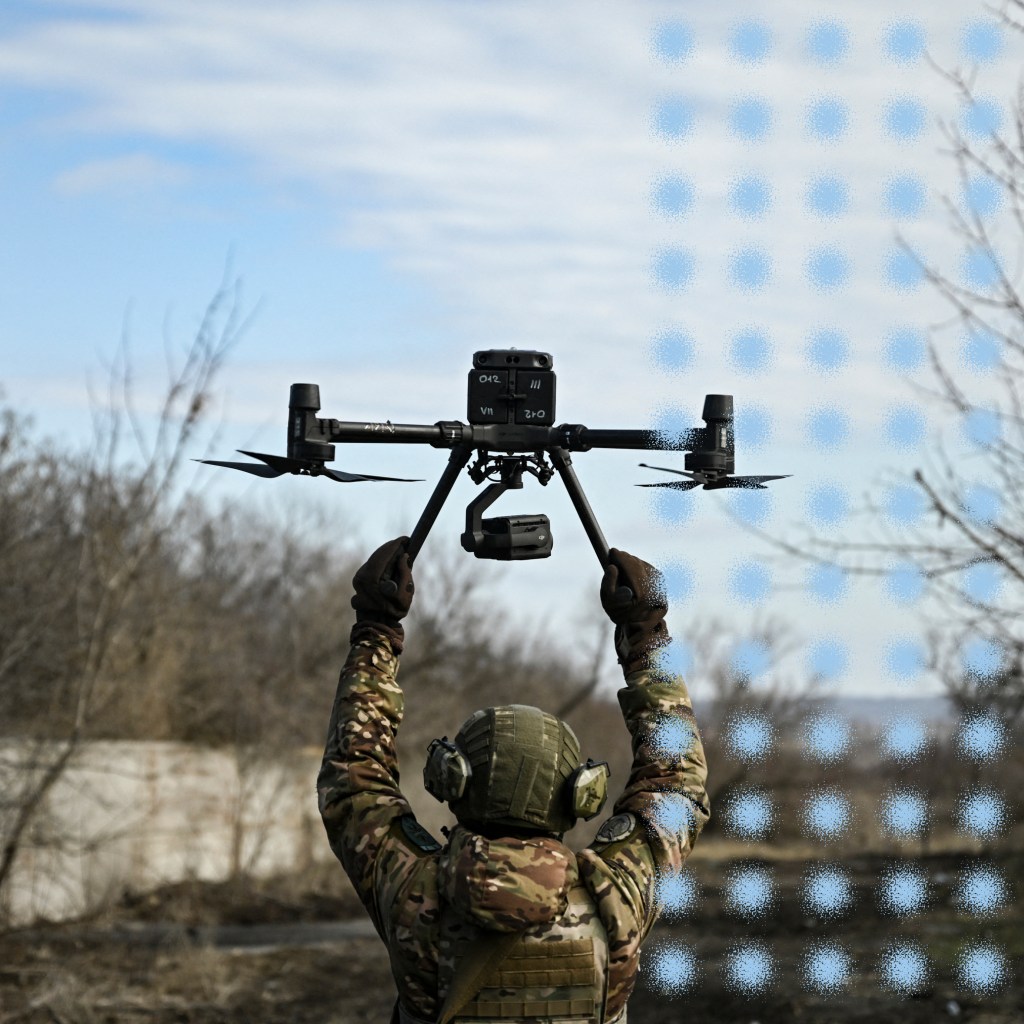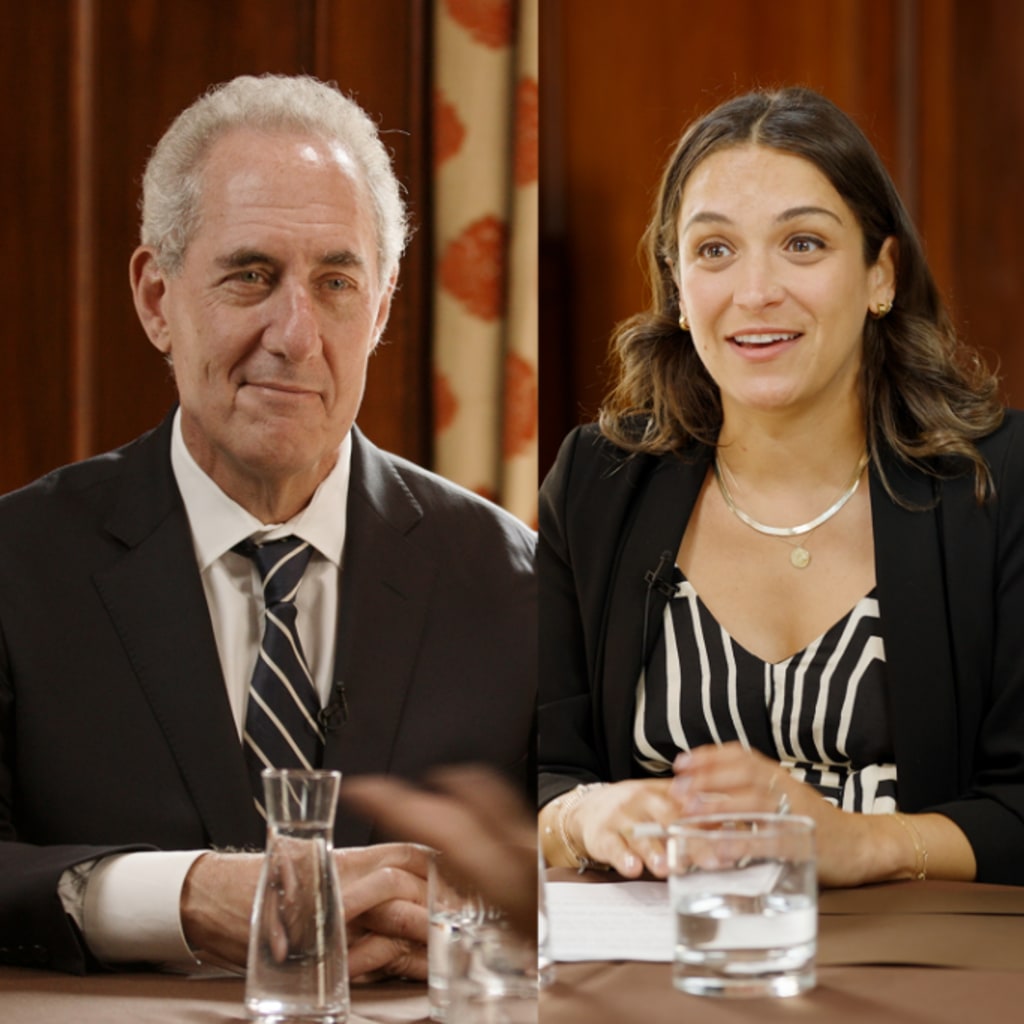What’s Cracking in the Arctic?
As rising global temperatures thaw the ice at the North Pole of the planet, competition between nuclear-powered states threatens to heat up the Arctic Circle even further. An increasingly minable Arctic, which contains vast natural resources, has piqued the economic interests of oil-hungry great powers, even as the warmer climate jeopardizes Indigenous tribes. Here’s how the Arctic could become the next frontier of great-power competition.
Published
Host
- Gabrielle SierraDirector, Podcasting
Guests
- Esther BrimmerJames H. Binger Senior Fellow in Global Governance
- Jeff RandallMilitary Fellow, U.S. Coast Guard
Supervising Producer
- Asher RossLead Content Strategist
Audio Producer and Sound Designer
- Markus ZakariaAudio Producer & Sound Designer
Associate Podcast Producer
- Molly McAnanyProducer, Podcasts
Show Notes
As global warming melts the Arctic ice, relationships between great powers are becoming icier than ever.
Commercial enterprises and great powers alike are staking their claims to the region, making it the newest frontier in the battle for control over Earth’s shared waters—and the precious natural resources that lie beneath the frozen sea. As the Arctic has warmed, these valuable commodities have become more extractable, providing a powerful financial incentive for those willing to brave newly navigable waters. For countries such as the United States and Russia, the Arctic Circle could become a tactical site to expand naval and nuclear operations. Meanwhile, countries including Russia and China are eager to slash costs by sailing through new Arctic sea routes. But while the warming temperatures generate compelling opportunities for sometimes-opposing foreign interests, climate change has imperiled the region’s ecosystems and the many Indigenous tribes who live in the frozen North. As tensions continue to rise, will the warming Arctic play host to a new Cold War?

From CFR
Brian L. Sittlow, “What’s at Stake With Rising Competition in the Arctic?”
Daniel McVicar, “How the Russia-Ukraine War Challenges Arctic Governance,” The Internationalist and International Institutions and Global Governance Program
From Our Guests
Thad W. Allen. Esther Brimmer, Anya Schmemann, and Christine Todd Whitman, “Arctic Imperatives: Reinforcing U.S. Strategy on America’s Fourth Coast,” CFR.org
Read More
Alejandra Borunda, “Arctic Summer Sea Ice Could Disappear as Early as 2035,” National Geographic
Alex Gatopoulos, “What Is Behind Russia’s Interest in a Warming Arctic?,” Al Jazeera
Costas Paris, Renée Rigdon, and Yaryna Serkez, “The Future of Arctic Shipping,” Wall Street Journal
Gwladys Fouche and Jacob Gronholt-Pedersen, “Dark Arctic: NATO Allies Wake up to Russian Supremacy in the Region,” Reuters
“National Strategy for the Arctic Region” [PDF], White House
Watch and Listen
“The Emerging Arctic,” CFR.org
“Climate Change and the Evolving Arctic,” CFR.org
“Why an Arctic Treasure Is Spurring Hope and Dread,” The Journal, Wall Street Journal
*Editor’s Note: In a narration for this episode, the Why It Matters team mistakenly stated that Russia will chair the Arctic Council for the next two years. In fact, Russia’s tenure ends in May, 2023. As of this writing, the next chair, Norway, has not committed to restarting stalled cooperation.
Transcript
Captain Jeff RANDALL: Imagine a place that is very white. And all you see around you is ice. All you see is vastness. All you see is great expanses of nothing. The ice never seems to end. It goes on forever. It’s an area of immense beauty or immense loneliness. That is the region that is the Arctic.
The Arctic. It sits at the top of the globe, is covered in snow and sea ice and has days without sunlight. We think of it in terms of extremes - harsh, cold, barren.
But the Arctic is also home to 4 million people, endangered species and a wealth of minerals and oil buried in the earth.
For centuries it was inaccessible to anyone but the most daring explorers and scientists. But now, as climate change takes its toll, the ice is melting fast, new routes are opening, and the world could be facing new competition over Arctic riches.
To complicate matters, no single country actually owns the place. The U.S. has a portion through Alaska. Russia has a large sector of Arctic territory in the far North, and six other countries have territories of their own. And in the middle is a vast section that belongs to everyone, and no one.
I’m Gabrielle Sierra and this is Why It Matters. Today, the Arctic, where diplomatic relations are teetering on thin ice.
Esther BRIMMER: The Arctic, you should think of as a frozen ocean surrounded by land. So they’re basically two big land masses.
This is Esther Brimmer, Senior Fellow in Global Governance here at the Council. She is a former Assistant Secretary of State for International Organization Affairs, which means she worked with a lot of global institutions on a lot of global issues, including the Arctic.
BRIMMER: One is the Eurasian landmass, including Russia and the Nordic countries, and the North American portion, which includes the United States state of Alaska and Canada. The North American side has coastal plains in parts of Alaska. It has a series of islands in Canada. And about 25,000 miles worth of coastline is in Russia. The US has a significant amount of about 6,000 miles of coastline. So these are big spaces, but they’re also very different spaces.
SIERRA: What is it like operating in Arctic extremes?
RANDALL: One, it’s cold. Two, there’s lots of ice, especially when you get up into the ice cap regions, there’s a beauty that exists there like no other place on Earth.
This is Captain Jeff Randall. He’s the visiting military fellow for the U.S. Coast Guard at the Council. Jeff has spent a great deal of time in the Arctic, leading two Coast Guard cutters and conducting fisheries law enforcement throughout the Pacific Arctic region.
RANDALL: And knowing the whole time that you’re operating up there that you’re very alone. If you’re a ship, there’s not a lot of gas stations. If there’s a person, there’s not a lot of grocery stores. If you’re trying to operate there, you have to think about your ability to sustain. You have to basically take everything with you that you need to operate there. So you’d have to stuff all that into your backpack, so to speak, and carry that up there with you, because at the same token, if you get in trouble there, if your car breaks down, or in this case your ship, you need to be prepared to stay there for a while or sustain yourself until rescue can come. It’s a very challenging region to operate in because you’re so far from anything, so far from anywhere.
SIERRA: So does anyone own the Arctic?
BRIMMER: That’s a very interesting question because you can think of the Arctic as having sort of two parts. There’s the part of the Arctic that is ocean, as we discussed, that in a sense is owned by everybody as what was commonly called ‘common heritage of mankind.’ That means that it’s governed by the United Nations Convention on the Law of the Sea, which pertains to the rules of the open ocean.
Arg the law of the sea! It may sound made up or like something pirates adhere to, but it is in fact a very real treaty. Basically, countries governing a shared region like space or the world’s oceans gets pretty tricky. Regions often have conflicting economic interests and claims. The Law of the Sea prescribes a framework for when and how countries can establish rights at sea - this includes specific rules for marking maritime boundaries, extracting resources, and navigating through foreign territory.
It’s important to note that the United States has never ratified the convention, though it does abide by the norms it establishes. While the Law of the Sea is real, there is a lot of ambiguity when it comes to what countries can and can’t do in open water. Things can get choppy!
BRIMMER: We have eight countries that have territory in the Arctic region. Those include Canada, Denmark, Finland, Iceland, Norway, the Russian Federation, Sweden, and of course the United States. I should note that the Kingdom of Denmark has territory in this area because of its relationship with Greenland. An important new factor is that China has become much more active in the Arctic. China is not technically an Arctic country. However, China has described itself as a near-Arctic nation because the very northern parts of Manchuria are just below the Arctic Circle.
China has been quite busy in the Arctic lately, doubling its investment in Arctic initiatives over the past decade, with a focus on mineral extraction, scientific research, and military research. President Xi Jinping has expressed ambitions to become a “polar great power,” and he recently integrated the development of a ‘Polar Silk Road’ into China’s existing Belt and Road initiative.
China’s presence could change dynamics in the Arctic. After all, most Arctic nations are allies through NATO, and tensions between Russia and NATO have been running high since the invasion of Ukraine.
BRIMMER: Of the eight Arctic nations, five of them have coastline directly on the Arctic Ocean. For those countries, they have, as all countries do, 12 nautical miles of territorial sea and then 200 miles of exclusive economic zone. So when we think about who owns the Arctic, there is the part that’s since held as ‘common heritage of mankind,’ the ocean in the middle, and the territorial waters around it, and then different nations have different rules about who owns land within their own countries, but we can think about it both as common heritage surrounded by territorial waters and territorial land.
While each state has its own territory, under the international Convention of the Law of the Sea, foreign vessels are allowed to travel peacefully through those areas. The law also bans weapons testing, spying, arbitrarily claiming new territory, and a number of other things. It also protects resources in coastal territories from foreign extraction, bolstering states’ authority over their zones of influence.
The Law of Sea provides structure to Arctic disputes, but there’s still a lot of gray area when it comes to shared waters. It’s easier to conduct business in claimed territory. And that is why Arctic countries spend a lot of time remapping their waters, in the hope that they can extend their claims.
RANDALL: A lot of the work that’s going on up there right now is to figure out the limits of those continental shelves, to figure out the limit of the claims, because there is the potential for resources on the seabed or under the sea floor, and potentially fisheries resources that countries could lay claim to.
SIERRA: So what is going on up there now? Why are we talking about it?
BRIMMER: The Arctic region brings together so many important trends at the same time. The first is that significant climate change is happening in the Arctic region.
PBS: Warming in the Arctic is having dramatic impacts now, with worse yet to come.
PBS: News for wildlife, native communities and global sea level rise is not good.
Sky News: A fragile ecosystem is being lost, and the effects are reverberating around the whole planet.
BRIMMER: Now, every day we pick up the headlines and we hear about climate change. That includes rapid temperature change, and we’re seeing that in the Arctic. The Arctic may be warming up at least twice as fast as the rest of the globe, maybe even three times as fast according to some experts. Indeed, the National Oceanographic and Atmospheric Administration known as NOAA says that the past seven years are collectively the warmest on record. What we’re seeing here is that because of the warming of the Arctic region, you’re having melting of the polar ice cap. It is conceivable that part of the Arctic Ocean could be navigable in the near term. Some people think 2050, some people 2040, some people think 2030. Well, that means you might be able to sail ships through an area that used to be ice. Therefore, we see a variety of economic interests because of the environmental change that say perhaps we have access to oil and gas, perhaps we can cut down the time of shipping between Europe and Asia.
Ships that currently navigate through the Suez or Panama canals could cut their shipping distances by up to half by traveling through the Arctic, which would mean huge savings in fuel over time.
WION: Typically, a ship from Rotterdam to Japan would use the Suez Canal and take thirty days. Once the Arctic ice melts, the new routes emerge. The distance is going to shrink.
CNBC: Arctic sea routes are potentially much more useful for avoiding the kind of bottlenecks that one would see in either the Panama or Suez Canal.
CNBC: It’s really a question of saving shipping costs, saving time, versus that lack of predictability.
BRIMMER: Let’s take a moment and look at the two major routes within the Arctic space. One is the Northern Sea Route, which runs through Russian waters, as well as international waters. You can think of the Northern Sea Route as one of the navigational routes that goes along the Eurasian coast within the Arctic region. The other major route includes the Northwest Passage and goes by the North American side of the Arctic.
The Northern Sea Route, running along the Russian Arctic coast, services most major Arctic ports and the rivers of Siberia. It’s a part of what’s known as the Northeast passage. The Northwest Passage, running up the other side, connects Alaska to Greenland and passes through several contested waterways. When it was first traversed in 1903, the Northwest Passage took three years to cross. Today, it takes about 24 days.
But these areas can also be very dangerous. Ships can face deadly rogue waves and surging storms as they cross, and if something goes wrong, there often aren’t any nearby ports to mount a rescue from.
BRIMMER: Operating and navigating in the Arctic is always challenging and 20 years from now, there could still be significant hazards of pieces of ice making it a challenging place in which to navigate. That said, the warming of the Arctic does open up possibilities of greater exploration for oil, gas, and minerals. And so there are companies and countries that are interested in greater investment in these areas.
Right now, the Arctic supplies about 10% of the world’s oil and a quarter of its natural gas. And scientists predict that there is much more buried under the ice.
BRIMMER: Production from these areas are extremely important. We note that for Russia, which is now currently under sanctions because of its invasion of Ukraine, that the Arctic oil that it produces is going to India and China, which means it’s still earning income from that because it’s able to get its oil out of the Arctic region to other suppliers now that they’re no longer delivering to Europe.
The U.S.-held Arctic is also energy rich. In fact, the Biden Administration recently approved a new drilling project called Willow in the Alaskan Arctic. Experts say it could reap over 600 million barrels of crude oil over the next thirty years. For people living in Arctic states, these investments can be polarizing - pitting local economic interests against cultural and environmental priorities. But this is only the most recent example in a long history of Arctic extraction.
BRIMMER: There are also enormous effects just of the environmental interest. It has direct impact on the livelihoods of people, it has direct impact on food sources for people, it has direct impact on a large number of animals who live in the area, including polar bears, whales, and others. Some of the megafauna that people are familiar with, that there could be fundamental changes in the habitats for marine mammals as well. There could be important changes in fishing. Fish and fish stocks, and the benefits of the sea are huge food sources. If water temperature changes, the movement of fish and other foods would also change. In addition to that, you have people whose homes, and livelihoods, and culture, would be lost as communities literally slip into the sea.
There are nearly half a million indigenous people living in the Arctic circle, spanning more than 40 different ethnic groups.
Fishing, hunting, and whaling are the main ways these communities have survived in this harsh region for over 15,000 years. But climate change and commercial ventures have led to a shift in migration patterns, impacting native food sources. And given many native communities live without access to running water or a functioning sewer system, many groups may soon be forced to relocate.
Alongside Arctic natives are 3.5 million non-indigenous hunters, herders, and city locals, who also rely on the region to raise their families, farm, and run businesses. These two groups often find themselves at the mercy of more powerful forces - a changing climate, and a group of large nations vying to control the region’s future.
BRIMMER: As we said earlier, there are about 4 million people living in the Arctic. About 2 million of them are in Russia, and about 500,000 are Indigenous people. Also, from the US perspective, have to recognize that these environmental challenges are also highlighting already existing challenges faced by Alaska native communities. There are at least 31 Alaska native communities that do not have reliable running water in their homes. 60% of Alaska native communities have been described as environmentally threatened by climate change. And finally, working in Alaska is challenging. Only about 20% of the State of Alaska is accessible by roads. Therefore, boats and aircraft are crucial for transportation. So that this important climate change is happening in an area that is complex, very large, and already difficult to work in, making the effort more challenging, and the need for cooperation, all that more important.
But instead of cooperation, as the ice continues to melt, the race for precious resources is going to heat up competition even further in the open Arctic. And because the stakeholders are either NATO-aligned countries, or NATO rivals, the chances for that economic competition to spill over into military tension has many analysts concerned.
Already, Norway and Russia are butting heads over control of the Norwegian Svalbard islands in the Arctic Circle. Russia is asserting that a historical right to mine there is being blocked by Ukraine War-related sanctions, and Moscow is threatening “retaliatory measures” if Norway doesn’t let them resume their operations in the region. Situations like this can get tense - fast.
SIERRA: And what about the military side of things? Is there a history of U.S. military presence in the arctic?
RANDALL: If you think about post-World War II, we entered into a period of a Cold War, where you basically had Russia and the US at odds with each other. During that time, and because of World War II, where the Japanese had actually invaded the Aleutians, you saw a buildup of military presence through early warning sites, through basing, through other infrastructure in the Arctic region. As the Cold War progressed, and as we ended up coming out of the Cold War in the early ‘90s, we let a lot of that infrastructure atrophy. Yes, we still have some early detection, we still have some presence up there, but some of the basing and some of the infrastructure we let atrophy over time. Then, as you saw Russia begin to militarize their Arctic, we began rethinking about our operations, our ability to sustain operations, and our ability to project military power from the Arctic region. And so, that’s brought us back to an era where we’re starting to think about infrastructure investments, thinking about our operations, and thinking about what investments we need to make in the regions to ensure that we can protect our sovereignty and project power, if needed, if there were to be conflict across the Bering Strait or other areas in the region.
As it stands, Russia is the dominant power in the Arctic, exceeding NATO’s number of military bases by a third. And in the past two years, Russia has upgraded nearly a dozen Soviet-era air strips at its Northernmost base and spent millions on artillery improvements for its Northern Fleet - the largest icebreaker armada in the world. And these are just some of the moves that have made other Arctic nations wary when it comes to Russia’s ambitions for the region.
SIERRA: Let’s talk about national security. What are we worried about when we look at the Arctic?
BRIMMER: The Arctic poses several challenges for national security. For one, half of the entire coastline in the United States is in Alaska. So first and foremost, you have just the normal defense of the United States borders. In addition, the United States is aware, of course, that Russia has been upgrading its military installations in the region, and it has been reinvesting in its infrastructure. We saw after the end of the Cold War a reduction in tensions, a greater spirit of cooperation, of which the Arctic Council is a good example.
The Arctic Council is an international forum that includes representatives from all 8 arctic nations, as well as from local communities. Formed in 1996, the Arctic Council brought together Russia and its former Cold War adversaries in the hope that they could cooperate to manage a region that was important to all of them. For years the Arctic Council was a symbol of fruitful cooperation between rivals, but now the organization’s fate is unclear. Russia is chairing the council for the next two years and very little cooperation is expected in the near term.*
SIERRA: Okay. So where do you see us going as a nation in the Arctic?
RANDALL: I think what you’re going to see is an area where we’re going to have to make some investment. I think you’re going to have to make some investment not only in our ability to operate up there through icebreaking capability in ships. I think you’re going to see some need for investment up there to make sure you have the ability to operate in a more continuous and sustained basis. I think you’re going to see probably some more military exercises up there, and not necessarily as a counter to what we see in Russia, but to show that we can operate up there and make sure that we are making the right investments to ensure our ability to operate in the region as needed.
BRIMMER: There’s several different ways of being present in the Arctic. One of them is physical presence. So for example, the Russian Federation, because it has the longest coastline within the Arctic region, has an important physical presence in the Arctic by virtue of its own geography. The Nordic states, again, because they have long coastlines have an important presence in the Arctic, but there are other ways of being present in the Arctic. And one of them is an area which is undergoing change at the moment. Both Finland and Sweden have applied to join NATO. This would mean if they’re approved by all the NATO states, that all of the members of the Arctic region, except for Russia, would be NATO members. So being part of an alliance is also part of being present in the Arctic. In a sense, NATO becomes more present in the Arctic.
SIERRA: How much energy should we be focusing on the Arctic at this point?
RANDALL: Well, I would tell you it’s a priority amongst priorities. And anytime you talk about priorities amongst priorities in government, the issue that is most close at hand tends to get the most attention. The Arctic is a bit of a slow burn issue and it’s going to be there, but if you don’t act sooner rather than later, you may find yourself closer to crisis, especially with climate change and other impacts to the indigenous communities or the region in general because you didn’t pay enough attention to it now. Right now, a lot of our national attention is focused on China-Taiwan, Russia-Ukraine. We’re only one another terrorism event from refocusing on counterterrorism. And so, then where does the Arctic fall? So I think it requires attention. I think it requires some advocacy. I think it requires some investment, and that needs to be on a sustained basis instead of episodic injects to make sure that we’re ready, postured to achieve those goals that are in the National Arctic Strategy.
BRIMMER: It also should be remembered that the Arctic in some ways is also part of a national spirit. Living in the Arctic has had an important cultural role for Canada, Russia, and the Nordic countries. And I would suggest that for the United States, one thing to think about is to broaden our understanding of how we think about the US in the world. We think of the Transatlantic, Trans-Pacific, and the Gulf. We think of our important neighbors to the North in Canada. But even beyond that, the United States is also an Arctic nation, so the Arctic Ocean is America’s fourth coast.
We live in an era of great power competition, and part of that competition could play out in a melting North pole. Caught in the whirlwind are indigenous people and local workers who depend on this changing region for their livelihoods, and a wealth of flora and fauna fighting to survive.
Like space, the Arctic is a region that we all wish could forever remain peaceful. A shared territory for scientific inquiry. But the oil beneath the waves, and the perilous but valuable sea routes that are opening up are a tempting prize that could make that cooperation difficult to maintain.
For resources used in this episode and more information, visit CFR.org/whyitmatters and take a look at the show notes. If you ever have any questions or suggestions or just want to chat with us, email at [email protected] or you can hit us up on Twitter at @CFR_org.
Why It Matters is a production of the Council on Foreign Relations. The opinions expressed on the show are solely that of the guests, not of CFR, which takes no institutional positions on matters of policy.
The show is produced by Asher Ross and me, Gabrielle Sierra. Our sound designer is Markus Zakaria. Our associate podcast producer is Molly McAnany. Our interns this semester are Emily Pace and Rebecca Rottenberg.
Robert McMahon is our Managing Editor, and Doug Halsey is our Chief Digital Officer. Extra help for this episode was provided by Noah Berman, Kali Robinson, and Jonathan Masters.
Our theme music is composed by Ceiri Torjussen. We’d also like to thank Richard Haass, Jeff Reinke, and our co-creator Jeremy Sherlick.
You can subscribe to the show on Apple Podcasts, Spotify, Stitcher, or wherever you get your audio.
For Why It Matters, this is Gabrielle Sierra signing off. See you around!
*Editor’s Note: In a narration for this episode, the Why It Matters team mistakenly stated that Russia will chair the Arctic Council for the next two years. In fact, Russia’s tenure ends in May, 2023. As of this writing, the next chair, Norway, has not committed to restarting stalled cooperation.






